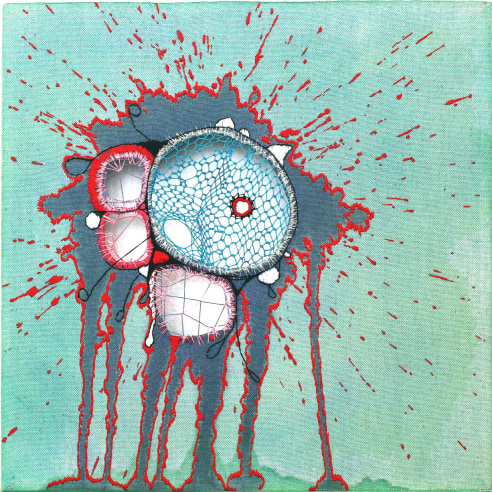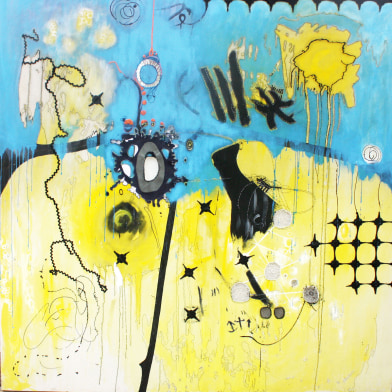
Tracey Morgan Gallery is pleased to present our first solo exhibition of artist Nava Lubelski, Things We Think We Know. A reception for the artist will be held Friday, April 26 at our new location at 22 London Road, Asheville, 6-8PM.
Working in an intuitive and improvisational mode, Lubelski uses a staggering array of materials – discarded balls of thread, found fabrics, cut paper, dirt, dryer lint, electric wire, smoke residue – to turn the time-honored tradition of craft on its head, diving deep into the beauty of violence and the art of chaos.
This exhibition of recent work, primarily in stitching and collage, is made entirely from the detritus of the home and studio. Scraps of what is damaged, worn out, or left over from other projects are given new life, elevating the fragmented, the forlorn and the forgotten bits, into something worthy of attention. Lubelski often incorporates knotted, “ruined” piles of thread that have been rendered unusable as their original purpose introducing an element of perceived randomness to a medium (embroidery) commonly reliant on order and predictability.
Using found fabrics as a ground, Lubelski adds hand-stitching for an aesthetic of “mending” which is reminiscent of the fabric equivalent of the Japanese art of Kintsugi in pottery. Accentuating stains and tears with her needlework, Lubelski focuses attention on these imperfections and celebrates their intrinsic beauty in an act that seems to be reminding us that the small incidents of everyday life are too markers of history.
Recent collage work on view nods to Wycinanki, or the folk art of paper cutting. These pieces are bold and colorful, with elements of pop and graffiti art, and an urgency that is electric.
Lubelski’s childhood in 1970s NYC informs her work in myriad ways, as the grit, grime, violence, and sense of possibility are all absorbed into her practice. Being the first-generation child of a WWII refugee and living with the residue of trauma, anger, fear, and loss, as well as first-hand understanding of how the victim can become the perpetrator, has informed her need to make work that can hold complexity and doesn’t pretend to purity or basic beauty.
Nava Lubelski’s work has been exhibited widely at museums such as the Queens Museum of Art, NYC; the Museum of Arts & Design, NYC; the San Diego Museum of Art, CA; the National Museum of Decorative Arts and Design, Oslo; the Mint Museum, Charlotte, NC; and the Asheville Art Museum, NC. Lubelski's work has been reviewed in The New York Times, LA Times, Art Forum, ArtNews, and The Village Voice, was the subject of a feature in American Craft, and has been included in many international contemporary art books. She has received grants from The Pollock-Krasner Foundation, the New York Foundation for the Arts, and the North Carolina Arts Council. Lubelski received a degree in Russian Literature & History from Wesleyan University and spent a year as a student in Moscow, Russia. She currently lives and works in Asheville, N


























